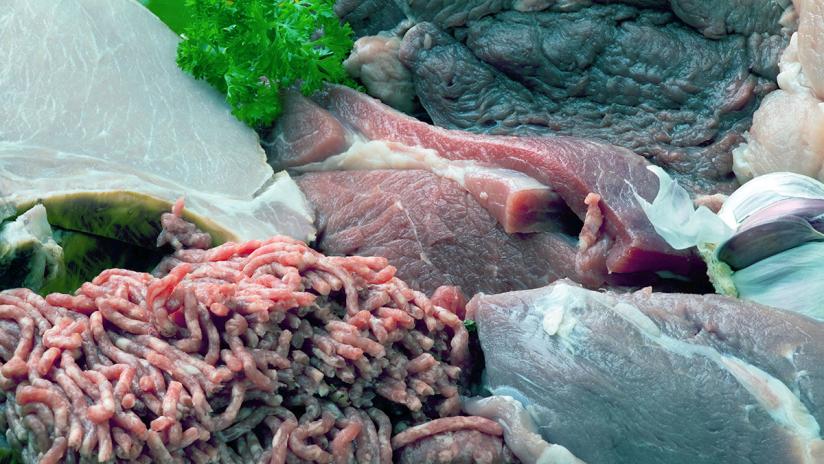Introduction To Off Odors In Pork

Off odors in pork refer to unpleasant smells that can arise from the meat due to various factors. These off odors can range from a sulfur-like or rotten egg smell to a sour or ammonia-like odor. Understanding the significance of off odors in pork is crucial as it can indicate spoilage or the presence of harmful bacteria. Factors contributing to off odors can include bacterial growth, improper storage conditions, or boar taint in uncastrated male pigs. Recognizing and addressing off odors in pork is essential for ensuring food safety and maintaining the quality of the meat.
Significance Of Off Odors In Pork
Off odors in pork are significant because they can indicate spoilage or the presence of harmful bacteria. These unpleasant smells serve as warning signs that the meat may not be safe for consumption. Ignoring off odors and consuming spoiled pork can lead to foodborne illnesses and gastrointestinal problems. Additionally, off odors can affect the overall taste and quality of the meat, making it unappetizing. Recognizing the significance of off odors in pork is crucial for ensuring food safety and avoiding potential health risks. It is important to discard pork with off odors and always prioritize fresh and properly stored meat.
Factors Contributing To Off Odors In Pork
There are several factors that can contribute to off odors in pork. One of the main factors is bacterial growth. When pork is exposed to certain types of bacteria, such as those that produce hydrogen sulfide or sulfur compounds, it can develop an unpleasant odor similar to that of eggs. Another factor is improper storage conditions. If pork is not stored at the correct temperature or is stored for too long, it can start to spoil and emit off odors. It is important to handle and store pork properly to prevent the development of these unpleasant smells.
Identification Of Off Odors In Pork

When it comes to identifying off odors in pork, there are a few key indicators to look out for. Firstly, common off odors in pork include a sulfur-like or rotten egg smell. This odor can be quite pungent and unpleasant. Secondly, you can recognize off odors in pork by conducting a visual inspection. If the pork appears discolored, slimy, or has an unusual texture, it may be an indication of spoilage. Lastly, trust your senses. If the pork smells off or gives you a sense of unease, it’s best to err on the side of caution and not consume it. Remember, it’s always better to be safe than sorry when it comes to food safety.
Common Off Odors In Pork
Common off odors in pork often include a sulfur-like or rotten egg smell. This distinctive odor can be quite strong and unpleasant. It is important to note that while fresh pork has a mild, slightly sweet scent, any strong or offputting smells may indicate spoilage. Other common off odors in pork can include a sour or ammonia-like smell. These odors are signs that the pork is no longer fresh and should not be consumed. It is always advised to trust your senses when it comes to identifying off odors in pork and to discard any pork that does not smell fresh.
How To Recognize Off Odors In Pork
To recognize off odors in pork, it is important to trust your senses. Take a sniff and pay attention to any unusual smells. If the pork has a sulfur-like or rotten egg odor, it is a clear sign of spoilage. Additionally, if you detect a sour or ammonia-like smell, it is best to avoid consuming the pork. Trusting your nose is crucial in identifying off odors and ensuring the freshness of the meat. When in doubt, it is always better to be safe than sorry and discard any pork with offputting smells.
Causes Of Pork Smelling Like Eggs

The smell of eggs in pork can be attributed to two main causes: boar taint and spoilage. Boar taint refers to the unpleasant odor or flavor that occurs in uncastrated male pigs due to the presence of androstenone and skatole compounds. This can cause a urine-like or musky scent in the meat. On the other hand, spoilage occurs when bacteria start to break down the proteins in the pork, resulting in a sulfur-like or rotten egg smell. Improper storage conditions, such as exposure to high temperatures or prolonged storage, can contribute to spoilage and the development of off odors in pork.
Role Of Bacteria In Causing Pork To Smell Like Eggs
Bacteria play a crucial role in causing pork to develop an off odor resembling eggs. When pork is exposed to bacteria, such as Escherichia coli or Salmonella, they begin to break down the proteins in the meat. As a result, volatile sulfur compounds are released, giving the meat a distinct rotten egg smell. These bacteria thrive in environments with poor sanitation or improper storage conditions. It is important to handle and store pork properly, ensuring it is kept at the correct temperature to prevent bacterial growth and the development of off odors.
Impact Of Improper Storage On Pork Odor
Improper storage of pork can have a significant impact on its odor. When pork is stored at temperatures above 40°F (4°C), bacteria can multiply rapidly, leading to the production of off odors. Additionally, exposure to air can cause oxidation, resulting in a rancid smell. Cross-contamination is another concern, as storing raw pork alongside other foods can transfer bacteria and odors. To prevent these issues, it is crucial to store pork in airtight containers or sealed packaging, separate from other foods. Proper refrigeration at temperatures below 40°F (4°C) is vital to maintain the quality and freshness of the meat.
Preventing Pork From Smelling Like Eggs

Proper handling and storage of pork are essential in preventing it from developing off odors that resemble eggs. Here are some tips to ensure that your pork stays fresh and odor-free:
- Store pork in airtight containers or sealed packaging to prevent exposure to air, which can lead to oxidation and a rancid smell.
- Keep raw pork separate from other foods to avoid cross-contamination and the transfer of bacteria and odors.
- Refrigerate pork at temperatures below 40°F (4°C) to slow down bacterial growth and maintain its freshness.
- Use fresh pork and avoid purchasing meat that already has an off odor.
- Cook pork thoroughly, as high temperatures can help eliminate any bacterial contamination and reduce the risk of off odors.
By following these guidelines, you can ensure that your pork remains odor-free and safe for consumption.
Proper Handling And Storage Of Pork
Proper handling and storage of pork is crucial to maintain its freshness and prevent it from developing off odors like those resembling eggs. When handling pork, it is important to keep it separate from other foods to prevent cross-contamination. Store pork in airtight containers or sealed packaging to minimize contact with air, which can lead to oxidation and a rancid smell. Refrigerate pork at temperatures below 40°F (4°C) to slow down bacterial growth. Additionally, ensure that you use fresh pork and avoid purchasing meat that already has an off odor. By following these guidelines, you can ensure that your pork remains odor-free and safe for consumption.
Tips To Avoid Off Odors In Pork
To avoid off odors in pork, follow these tips:
- Purchase fresh pork: Choose pork that is bright pink, firm to the touch, and has no unpleasant odor.
- Proper storage: Store pork in the refrigerator at temperatures below 40°F (4°C) to slow down bacterial growth. Use airtight containers or sealed packaging to prevent contact with air.
- Separate raw and cooked pork: Keep raw pork separate from cooked foods to avoid cross-contamination.
- Use within the recommended time: Use pork within its expiration date or within a few days of purchase to ensure freshness.
- Cook pork thoroughly: Properly cooking pork to the recommended internal temperature of 145°F (63°C) kills bacteria and eliminates off odors.
By following these tips, you can maintain the quality and freshness of pork and avoid off odors.
Safety Concerns And Health Risks

Consuming pork with off odors can pose safety concerns and health risks. Off odors in pork are often an indication of bacterial growth, which can lead to foodborne illnesses such as salmonella or E. coli infections. These bacteria can cause symptoms like diarrhea, vomiting, and abdominal pain. Additionally, the presence of off odors in pork may indicate that the meat has spoiled and is no longer fit for consumption. It is important to follow proper food safety guidelines, including storing and handling pork correctly, to minimize the risk of consuming contaminated meat. Always remember to discard pork that has a strong sulfur-like or rotten egg odor to ensure your health and safety.
Health Implications Of Consuming Pork With Off Odors
Consuming pork with off odors can pose significant health risks. Off odors in pork are often an indication of bacterial growth, which can lead to foodborne illnesses such as salmonella or E. coli infections. These bacteria can cause symptoms like diarrhea, vomiting, and abdominal pain. Additionally, the presence of off odors in pork may indicate that the meat has spoiled and is no longer fit for consumption. It is crucial to follow proper food safety guidelines and discard any pork that has a strong sulfur-like or rotten egg odor to ensure your health and safety.
Food Safety Guidelines Related To Pork Odor
To ensure food safety and prevent health risks, it is important to follow certain guidelines when it comes to pork odor. If you detect any strong sulfur-like or rotten egg smell in pork, it is recommended to discard it immediately. When purchasing pork, check the sell-by date and look for fresh cuts. Proper storage is also crucial – keep pork refrigerated at a temperature below 40°F (4°C) and use it within 2-3 days. When cooking pork, ensure it reaches a safe internal temperature of at least 145°F (63°C). Following these guidelines will help protect you from potential foodborne illnesses associated with off odors in pork.
Conclusion

In conclusion, understanding the phenomenon of off odors in pork is crucial for ensuring food safety and quality. The smell of pork resembling eggs, often attributed to bacterial growth or improper storage, indicates spoilage and potential health risks. By following proper storage and handling techniques, using fresh ingredients, and incorporating cooking methods and seasonings, the unpleasant odor can be minimized or masked. It is essential to remain vigilant in detecting off odors in pork and taking necessary precautions to protect against consuming spoiled meat. By doing so, we can enjoy safe and delicious pork dishes.
Understanding Off Odors In Pork And Taking Necessary Precautions
When it comes to off odors in pork, understanding the causes and taking necessary precautions is imperative for food safety. By being aware of the factors that contribute to off odors, such as bacterial growth and improper storage, individuals can take steps to prevent the occurrence of these unpleasant smells. This includes practicing proper handling and storage techniques, using fresh ingredients, and incorporating cooking methods and seasonings that can help mask any off odors. By being proactive and vigilant in ensuring the quality and safety of pork, individuals can enjoy delicious and safe meals without any worries.
FAQ About Pork Smells Like Eggs: Understanding Off Odors In Pork
Q: Why does pork sometimes smell like eggs?
A: Pork can develop a sulfur-like or “eggy” smell due to the presence of bacteria that produce hydrogen sulfide gas as a byproduct, especially when the meat is stored improperly or for too long.
Q: Is pork with an egg-like smell safe to eat?
A: It is not recommended to consume pork that smells like eggs as it may indicate spoilage or bacterial contamination, which can pose health risks if consumed.
Q: How can one prevent pork from smelling like eggs?
A: To prevent pork from developing off odors, ensure proper storage of the meat in the refrigerator at the correct temperature, cook it thoroughly to kill any bacteria, and use it within a reasonable timeframe.
Q: What are other signs that pork has gone bad?
A: Apart from smelling like eggs, signs of spoiled pork include a sour or putrid odor, slimy texture, unusual discoloration, and the presence of mold or visible signs of decay.
Q: Can cooking eliminate the egg-like smell in pork?
A: Cooking may help reduce some odors in pork but it is not guaranteed to fully eliminate the off smell. It is best to discard pork that smells like eggs to avoid any risks of foodborne illnesses.
Q: When should one seek professional advice regarding off odors in pork?
A: If you have any concerns about the quality or safety of pork, especially if it exhibits strange odors like those resembling eggs, it is advisable to consult a food safety professional, butcher, or discard the meat to avoid potential health hazards.

Johnny Knuckles Knock-out BBQ is a culinary haven for barbecue enthusiasts, offering a fusion of traditional BBQ and tantalizing street fare. Our secret to delivering mouthwatering dishes lies in our meticulous preparation process. Each cut of meat is lovingly hand-rubbed and slow-smoked over 100% hardwood, creating a symphony of flavors that will leave your taste buds dancing. Whether planning a special event or simply craving an unforgettable meal, Johnny Knuckles Knock-out BBQ is here to elevate your dining experience. Our catering services are designed to bring the sizzle and aroma of our delectable BBQ to your event, ensuring that every guest leaves with a full belly and a smile.